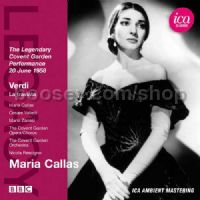La Traviata (ICA Classics Audio CD) 2-CD set
La Traviata (ICA Classics Audio CD) 2-CD set
Special Offer
* Estimated price converted from UK retail price
Maria Callas (Violetta)
Cesare Valletti (Alfredo)
Mario Zanasi (Giorgio Germont)
Marie Collier (Flora)
Forbes Robinson (Barone Douphol)
Ronald Lewis (Marchese d'Obigny)
Leah Roberts (Annina)
Dermot Troy (Gastone)
David Kelly (Dottore Grenvil)
Royal Opera House Orchestra & Chorus
Nicola Rescigno, conductor
Maria Callas (1923-1977) needs no introduction as she was quite simply one of the greatest singers of the 20th century. Any recording is of major importance and this Traviata from 1958 given in London’s Royal Opera House, Covent Garden is no exception.
Peter Heyworth in the Observer commented, ‘it was a performance of outstanding distinction and musicality, full of details that illuminated again and again the part as though for the first time’.
Opera News said, ‘there must have been many Verdi lovers who felt at last that they had come face to face with Violetta herself...’
John Ardoin in his book The Callas Legacy was very enthusiastic about the performance, not only Callas but also the Germont of Mario Zanasi for example, ‘Zanasi’s intrinsic musicality combined with Callas’s wealth of insights to bring the lengthy second act scene between Germont and Violetta to a living realisation. This duet is a study in contrasts, tensions and releases on the highest expressive level’.
Of Callas herself, Ardoin went on to say ‘it is in the final Act that Callas makes the tragedy of Violetta most immediate. The opening recitatives and “Addio del passato” are from another world…Callas’ Violetta is summed up in the strain “Se una pudica vergine” sung in a half-lit legato of breathtaking eloquence’. Ardoin praised the conductor Nicola Rescigno who ‘brings sanity and song to the performance and was remarkably at one with Callas in the ends she sought’.
This recording drawn from private tapes has been remastered by Paul Baily using ICA’s Ambient Mastering process which has enhanced and widened the sound considerably. Here is his description: “Our Ambient Remastering process creates a sense of space and width to a mono, or very narrow stereo, recording. No artificial reverberation is added in this process, so that it remains faithful to the natural acoustic of the original”.




